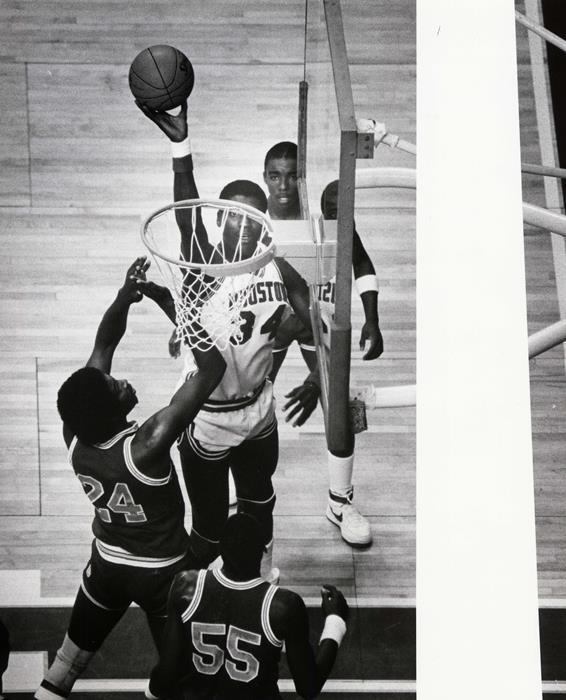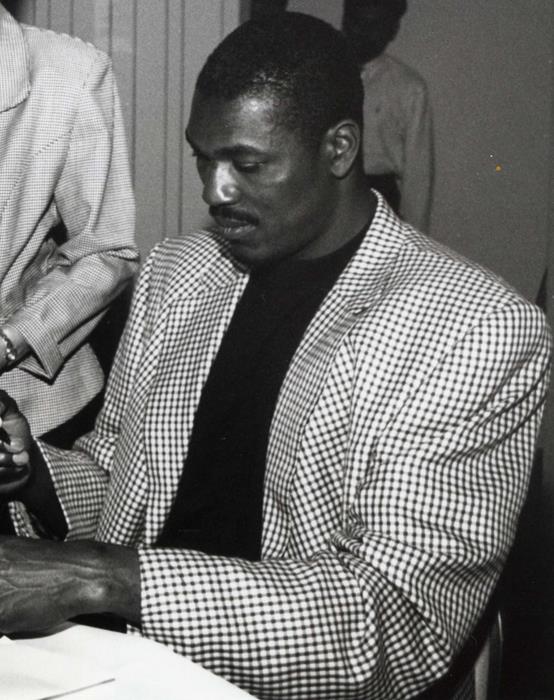Hakeem Abdul Olajuwon is a Nigerian-American basketball player who dominated the National Basketball Association’s courts between 1984 and 2002. Renowned as “The Dream,” he cemented himself as one of the league’s top-notch players not only of his era but in the entire NBA.
Olajuwon’s popularity among basketball fans can be attributed to his distinct playing style that blends strategic defensive skills with swift offensive prowess. In this article, let’s know more about Hakeem Olajuwon’s life and his journey and success in the world of basketball.
Early Life and Collegiate Career

On January 21, 19633, Hakeem Olajuwon in Lagos, Nigeria. His Yoruba parents are Salim and Abike Olajuwon, owners of a cement business, who played their duty of inculcating the principles of discipline, hard work, honesty, and respect for him and his seven siblings.
During childhood, Olajuwon was actually a soccer goalkeeper throughout his childhood and early teenage years. Nevertheless, it has been instrumental in teaching him agility, balance, and footwork, given that he stands at 7 feet (2.13 meters).
It was only at the age of 15 and in high school when he started playing basketball. After two years of learning the sport, he emigrated from Nigeria to the United States as he was recruited to play for the University of Houston. In his first playing season, the team made it to the final four in the 1982 National Collegiate Athletic Association (NCAA) tournament.
The following year, Houston made it to the Finals, with Olajuwon being named as the Most Outstanding Player. However, it went for naught, as the team lost to North Carolina State University in an upset. They returned to the Finals in 1984 but fell short once more against Georgetown University.
Houston Rockets
After the 1983-84 NCAA season, Olajuwon decided to join the NBA draft. He was selected by the Houston Rockets and became the top pick in the 1984 NBA draft, ahead of other stars, such as Charles Barkley, John Stockton, and Michael Jordan.
In his first season with the Houston Rockets, Olajuwon ranked second place in the Rookie of the Year, lagging behind the 1984 Rookie of the Year winner and his teammate, Ralph Samson. Together, they helped the Rockets reach the playoffs. The following year, Olajuwon led the team to the NBA Finals but lost to the Boston Celtics.
In the 1987-88 season, Samson’s knee injury started, which eventually ended his NBA career. The Rockets’ performance dwindled, only reaching beyond the first once in five years, from 1987 to 1992.
Nevertheless, Olajuwon continued to display remarkable individual play, making him the Rocket’s franchise player. He also developed his signature move called “Dream Shake,” characterized by a series of spins, feints, and drop steps that Olajuwon would do near the basket, leaving his opponents perplexed while giving him a free shot.
Though the 1989-90 season was another bad year for the Rockets, Olajuwon became the league’s leader in rebounds and became one of the three NBA players to register a quadruple-double performance.
The 1991 and 1992 seasons were no different, with the team showing dismal outings. With that, Olajuwon asked for a trade, pointing to unsatisfactory performance and contract issues, causing him to be nearly released before the 1992–93 season.
The Rise of the Houston Rockets
The Rockets started with a new coach, Rudy Tomjanovich, whilst Olajuwon improved his performance. He set a new career-high of 3.5 assists and 26.1 per game and finished as the runner-up in the MVP race, behind the winner, Charles Barkley. Olajuwon’s contract was extended for another four years. It was a perfect time as he was entering his prime, and the team had also established a solid core of young players and veterans behind his leadership.
Olajuwon’s career peaked in the 1993-1994 season, as he led the Houston Rockets to the NBA Finals against the New York Knicks, which was then led by his collegiate rival, Patrick Ewing. The series was stretched to Game 7. Olajuwon’s heroics helped the Rockets overcome the Knicks, averaging 26.9 points per game, with a 50% shooting percentage, and leading Houston to their first NBA Championship win.
In that season, Olajuwon was, indeed, on the pinnacle of his career, becoming the first NBA player to be awarded the “Defensive Player of the Season,” “MVP,” and “Finals MVP,” all in the same season. Riding on their momentum, the Rockets swept the Orlando Magic in the NBA Finals the following season and were again named Finals MVP.
The Fadeaway
While Olajuwon continued to display remarkable performance, Michael Jordan’s return from an 18-month hiatus prevented the Rockets from getting another shot at the Championship. In the last years of the 1990s, Olajuwon started to shy away from the limelight with his point production dipping.
In 2001, he refused a $13 million deal with Houston and was traded to Toronto. He only played one season with the Raptors, before retiring the following year due to a back injury. Shortly after, Olajuwon’s #34 jersey was retired by the Houston Rockets.
After his retirement, 12-time All-Star Hakeem Olajuwon was 7th in career points, recording a total of 26,946, and 11th in career rebounds, registering 13,748. In 2008, he was elected into the Naismith Memorial Basketball Hall of Fame.
Other Interesting Facts About Hakeem Olajuwon
Hakeem Olajuwon, one of the most celebrated basketball players, has many interesting aspects of his life beyond his well-known early career and time with the Houston Rockets. Here are some intriguing facts that highlight different facets of his life and personality.
- Multilingual Abilities: Hakeem Olajuwon is fluent in several languages, including English, French, Arabic, and Yoruba. This skill has helped him connect with fans and people from various backgrounds.
- Nickname Origin: He earned the nickname “The Dream” during his college years at the University of Houston. His teammates gave him this name because of his incredibly smooth and effortless playing style.
- Fashion Sense: Olajuwon is known for his keen sense of fashion. He has been featured in various fashion magazines and has a reputation for his stylish and sophisticated wardrobe choices.
- Entrepreneurial Ventures: After retiring from basketball, Olajuwon ventured into real estate. He has successfully developed properties in Houston and other cities.
- Faith and Religion: Hakeem Olajuwon is a devout Muslim. His faith has played a significant role in his life, influencing his approach to basketball and personal conduct. He often speaks about how his religion has guided him throughout his career.
- Citizenship: Though originally from Nigeria, Olajuwon became a naturalized American citizen in 1993. This allowed him to represent the United States in the 1996 Olympics, where he won a gold medal.
- Cooking Skills: Hakeem is also known for his cooking skills. He enjoys preparing traditional Nigerian dishes and often cooks for his family and friends.
- Philanthropy: Olajuwon is deeply involved in philanthropic activities. He has donated significant amounts to various charities and has funded educational programs in both the United States and Nigeria.
- Art and Creativity: Beyond sports and business, Olajuwon has a passion for art. He enjoys painting and has created several artworks that reflect his heritage and experiences.
Conclusion
Hakeem Olajuwon, known as “The Dream,” remains one of the most influential figures in NBA history. His extraordinary skills on the court, combined with his dedication and work ethic, have left a lasting legacy. Beyond his athletic achievements, Olajuwon’s contributions to his community, his business ventures, and his personal values showcase the depth of his character.



